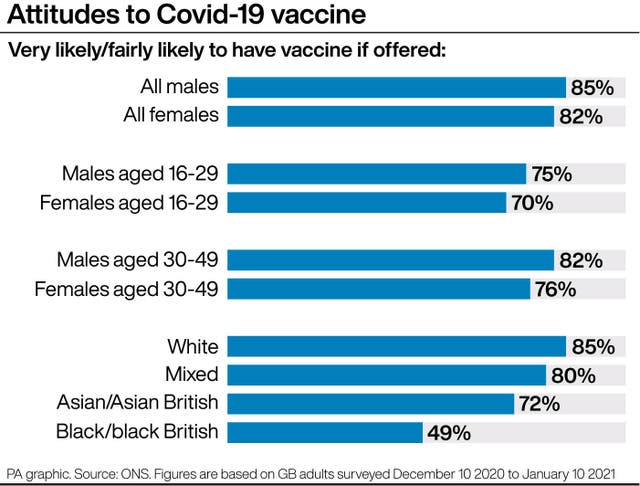Ethnic minorities, younger adults and women are less likely to say they will get a coronavirus vaccine, according to figures.
Overall, 88% of adults said they would be very or fairly likely to have the vaccine if offered, the Office for National Statistics (ONS) said.
Some 4% were very or fairly unlikely and less than 1% said they had declined the offer of a vaccine.
So far, 7.4 million people have had at least one vaccine dose across the UK.
The ONS analysed data from December 10 to January 10 to examine attitudes towards vaccination of more than 14,000 people in Britain and how this may vary by sex, age, disability, ethnicity, health and region.

The survey did not include adults living in care homes or other establishments, so does not address vaccinations in these settings.
It said the findings should be treated with caution, as some of the sub groups analysed had small sample sizes.
Less than half (49%) of 150 black or black British adults said they would be likely to get the vaccine, compared to 85% of 13, 240 white adults.
More than a quarter (28%) said they would be unlikely to do so, as did 7% of white adults.
Some 13% of 170 people with mixed ethnicity and 8% of 460 Asian or Asian British adults said they would be unlikely to get a jab.
A document released by the Government’s Scientific Advisory Group for Emergencies (Sage) earlier this month said among the barriers to vaccine uptake is the perception of risk, low confidence in the vaccine, and lack of endorsement from trusted providers and community leaders.
NHS England has said it is “supporting local authorities in their vital work with their diverse communities and faith groups to promote vaccine acceptance and willingness to accept the vaccination offer”.
We all have to do something to help one another during these difficult times. Here's a message we have recorded for members of our Ethnic Minority communities. Please share and retweet. #covid19 #vaccine pic.twitter.com/16YUvgxxse
— Adil Ray OBE 💙 (@adilray) January 25, 2021
Younger adults were less likely to report wanting the vaccine if offered compared with older adults, and rates were lower in women compared to men.
The biggest gender difference was for those aged 30 to 49 years, with 76% of women likely to have a vaccine and 82% of men.
This gap was present amongst younger age groups but disappeared among the over-70s.
Examining reasons among those who said they were unlikely to get a jab overall, 48% said they were worried about potential side-effects, 46% about any long-term health impact, and 44% wanted to wait to see how well the vaccine works.
Almost a third (32%) said they do not think the vaccine will be safe.
Almost two-thirds (64%) of adults from ethnic minority background who said they were unlikely to get a jab said they were worried about potential side-effects.
Among a small number of clinically extremely vulnerable adults who said they would be unlikely to get vaccinated, 44% said they were worried about any impact on an existing health condition.
Some 30% of disabled adults unlikely to get a vaccine said the same. This compares to 11% of adults overall.
Before approval, the vaccines underwent a rigorous testing process to pass standards of safety, quality and effectiveness set by the Medicines and Healthcare products Regulatory Agency (MHRA).
Reports of serious side-effects, such as allergic reactions, have been very rare, and no long-term complications have been reported, the NHS says.
Habib Naqvi, director of the NHS Race and Health Observatory, said: “Vaccine hesitancy amongst some groups, including from black and other minority communities, reiterate the critical need for local diverse, tailored support and communications to tackle misinformation, increase trust and ensure reasoned decisions are made based on facts.”




Comments: Our rules
We want our comments to be a lively and valuable part of our community - a place where readers can debate and engage with the most important local issues. The ability to comment on our stories is a privilege, not a right, however, and that privilege may be withdrawn if it is abused or misused.
Please report any comments that break our rules.
Read the rules here